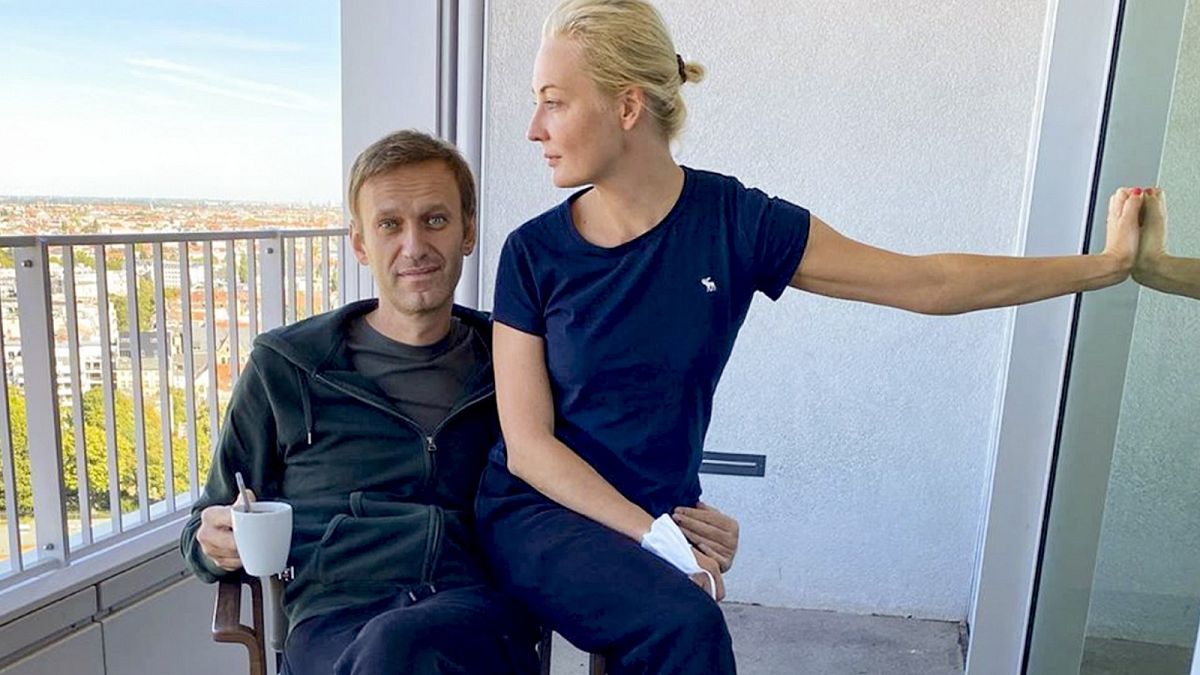"Regarding his return to Moscow, he is free, like any Russian citizen, to do so at any time," Kremlin spokesman Dmitry Peskov said, according to Russian news agencies.
The German hospital treating Russian opposition leader Alexei Navalny for Novichok poisoning says his condition improved enough for him to be released.
In a statement released on Wednesday, the Charité hospital in Berlin said that after 32 days in care, Navalny’s condition “improved sufficiently for him to be discharged from acute inpatient care.”
The hospital said that Navalny, 44, had been discharged on Tuesday.
The hospital says that “based on the patient’s progress and current condition, the treating physicians believe that complete recovery is possible,” but that it’s still too early to gauge the potential long-term effects of his poisoning.
Responding to the news of his discharge on Wednesday, the Kremlin said Navalny was "free" to return to Russia if he wanted.
"Regarding his return to Moscow, he is free, like any Russian citizen, to do so at any time," Kremlin spokesman Dmitry Peskov said, according to Russian news agencies.
Rehabilitation
In a post on his Instagram account on Wednesday, Navalny recalled his road to recovery, including the "melancholy" of being allowed on the hospital balcony for five minutes twice a day to enjoy the weather and see parks and trees from above.
"The first time they took me to the mirror, after 24 days in intensive care (of which 16 were in a coma), a character from the movie "The Lord of the Rings" looked back at me," he wrote. "And believe me, it was not an elf at all. I was terribly upset: I thought that I would never be discharged."
He also outlined his potential future treatment needs.
"The plans are still simple: a physiotherapist every day. Possibly a rehabilitation centre. Stand on one leg. Take back control of your fingers completely. Keep balance," he wrote.
"It's funny. I dreamed of learning how to ride a wakeboard behind a boat on the wave and learned this summer. Now I'm learning to stand on one leg," he added.
"Swallowed poison himself"
The opposition figure and anti-corruption activist, who is one of President Vladimir Putin's fiercest critics, fell into a coma after becoming ill on a domestic flight from Siberia to Moscow last month.
Navalny was transferred to the Charité hospital in the German capital on August 22 after two days of treatment in a Russian hospital.
In an Instagram post on Tuesday, Navalny took swipe at Putin, scoffing at reported comments by the Russian president to French president Emmanuel Macron suggesting he might have “swallowed the poison himself.”
“Good theory, I believe it deserves the most careful attention,” Navalny wrote.
“Cooked Novichok in the kitchen. Took a sip from a flask on the plane. Fell into a coma.”
He wryly wrote then the “ultimate aim of my cunning plan” must have been to die in Siberia, where the cause of death would be “lived long enough.”
“But Putin outmanoeuvered me. You can’t fool him,” Navalny wrote. “As a result, I lay in coma for 18 days like a fool, but didn’t get my way. The provocation failed!”
Investigation into poisoning
The German government was criticised by Russia after it said there was "unequivocal" evidence that Navalny had been poisoned with the Soviet-era nerve agent Novichok.
German authorities said that tests carried out in labs in Germany, France and Sweden confirmed the presence of Novichok in the politician's system.
The "weapons-grade" chemical agent was first produced in the Soviet Union but was banned under the 1997 Chemical Weapons Convention.
Chancellor Angela Merkel went as far as stating the attack on Navalny amounted to "attempted murder."
Russia has denied any involvement in the poisoning, initially declining to open an investigation into the incident.
On Monday, Navalny demanded that Russian authorities return the clothes he was wearing at the time of the incident, calling it a “very important material evidence.” He added that Novichok was found “in and on” his body.
In a blog post, he wrote: "I demand that my clothes be carefully packed in a plastic bag and returned to me."
In a further statement on Monday, Navalny blasted Russian authorities for not launching a criminal probe into what happened to him.
"There is no criminal case in Russia, there is a 'preliminary inquiry regarding the fact of hospitalisation.' It looks as if I didn't fall into a coma on a plane, but rather tripped in a supermarket and broke my leg," Navalny wrote.
Russian police said they started a preliminary probe — an inquiry to determine whether a criminal investigation should be launched — after Navalny was hospitalised.
Navalny and his allies argued that, according to existing regulations, the inquiry should have been completed in 30 days. Those 30 days ran out on Saturday September 19.
The hospital said the decision to make details of the politician's condition public was made by Navalny and his wife, Yulia.
Navalny's team has said he eventually plans to return to Russia, but had no immediate statement after his release from the hospital.
